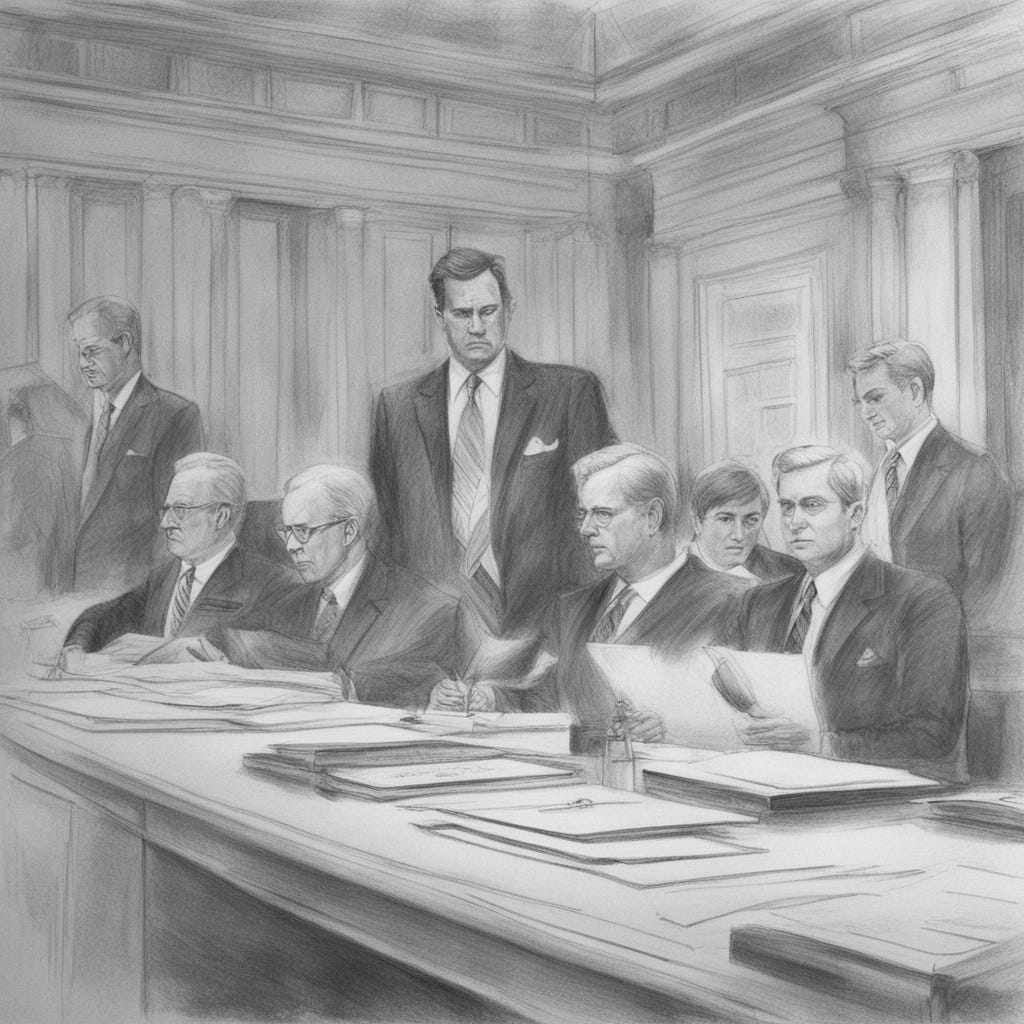On this day in legal history, September 27, 1964, the Warren Commission released its report on the Kennedy assassination, concluding that Lee Harvey Oswald acted alone in the plot.
The Warren Commission report, released after a thorough 10-month investigation, aimed to provide definitive answers regarding the assassination of President John F. Kennedy. Headed by Supreme Court Chief Justice Earl Warren, the commission concluded that Lee Harvey Oswald acted as a lone gunman, dismissing any theories of domestic or international conspiracy in the assassination. The report also addressed the role of Jack Ruby, a nightclub owner who killed Oswald on live television. It found that Ruby had no prior interactions with Oswald, thereby ruling out any coordinated effort between the two.
The commission's findings detailed the sequence of events on that fateful day, stating that Oswald fired three shots from a rifle. These shots were taken from a window on the sixth floor of the Texas School Book Depository and were responsible for both killing President Kennedy and injuring Texas Governor John Connally. The report went to great lengths to describe various aspects of Oswald's life, including his time spent in the Soviet Union. However, it notably refrained from delving into Oswald's motives for the assassination.
While the Warren Commission report has been the subject of scrutiny and debate, it remains a seminal document in the study of President Kennedy's assassination. Its conclusions have been both supported and challenged by subsequent investigations, but the report itself stands as a comprehensive governmental response to one of the most shocking and tragic events in American history.
O'Hagan Meyer, a Chicago-based boutique law firm, has significantly expanded its labor practice in California, thanks to the downfall of Daugherty Lordan, a firm that emerged from a mass departure from Lewis Brisbois Bisgaard & Smith. Between May 1 and September 16, O'Hagan Meyer hired 75 attorneys, ranking fourth in hiring among U.S. law firms, according to data from Firm Prospects. The firm even outpaced hiring at some of the country's 20 largest firms. The collapse of Daugherty Lordan, marred by controversial emails from its founders, provided O'Hagan Meyer with a unique opportunity to absorb more than 50 attorneys from the defunct firm.
Within six days of Daugherty Lordan's closure, O'Hagan Meyer announced the opening of a new office in Los Angeles, expanding its presence in the city. Nearly 20 of the firm's attorneys in this new office are former employees of Lewis Brisbois, Barber Ranen, or Daugherty Lordan. The firm also opened an office in Sacramento and expanded its San Francisco office, bringing in key personnel from the closed firms.
California's complex labor laws make it a crucial market for employment law, a fact acknowledged by O'Hagan Meyer in a statement. The firm said it was thrilled to add almost 80 employment attorneys in California. The state has seen a surge in the hiring of labor and employment lawyers due to ongoing changes in workplace diversity, equity, and inclusion initiatives, as well as unionization efforts and salary disclosure regulations.
Lewis Brisbois Defector Firm’s Flop Is Boon for Labor Boutique
The U.S. Supreme Court has upheld a ruling requiring Alabama to create a second congressional district with a near-majority of Black voters. This decision rejects Alabama's latest attempt to reinstate a Republican-drawn voting map. The high court's order came without public comment or dissent, reinforcing its previous ruling on June 8, which found the Republican map to be discriminatory. That June ruling had upheld a decision by a three-judge federal court panel mandating a second majority-Black district.
Alabama had argued that the Supreme Court's June decision allowed for the state to redraw its map without necessarily creating a second majority-Black district. However, the lower court struck down this new map as well. The panel expressed deep concern that Alabama had enacted a map that did not meet the federal requirements specified.
The case has been under close scrutiny because similar redistricting battles are taking place in Louisiana, Texas, and Georgia. These cases could influence the control of the U.S. House of Representatives. If Alabama's request had been approved, it would have almost assured that the Republican-drawn map would be used in the 2024 elections.
Democrats and civil rights activists argue that the Voting Rights Act necessitates Alabama to create a second district where Black voters have enough numbers to elect their preferred candidate. Alabama has seven U.S. congressional seats and a Black population constituting 27% of the state. The state had asked the Supreme Court to block the lower court's ruling while it pursued an appeal, but this request was denied. The case is captioned as Allen v. Milligan.
Alabama Again Rejected by Supreme Court on GOP-Drawn Voting Map
A New York judge, Justice Arthur Engoron, has found former U.S. President Donald Trump and his family business liable for fraud, stating that they inflated the value of their properties and assets. This ruling could significantly impact Trump's ability to conduct business in New York. The decision also paves the way for New York State Attorney General Letitia James to establish damages in a trial scheduled for October 2. Engoron ordered the cancellation of business certificates for some of Trump's enterprises, including the Trump Organization, and appointed a receiver to manage their dissolution.
The judge criticized Trump and his adult sons, Donald Jr. and Eric, for fabricating valuations to suit their business needs. The court also sanctioned the defendants' lawyers for making "preposterous" legal arguments. Trump and his legal team plan to appeal the decision, calling it a "miscarriage of justice."
The case has garnered attention as Trump is seeking the Republican presidential nomination for 2024, despite facing multiple criminal charges. In response to the ruling, Trump took to his Truth Social platform to denounce the judge and the case as a "witch hunt."
The lawsuit, initiated by James in September 2022, accused Trump and his organization of lying about asset values to defraud banks and insurers. The judge stated that Trump had overstated his net worth by between $812 million and $2.2 billion, including significant overvaluations of his Mar-a-Lago estate and Manhattan penthouse.
This ruling comes after an appeals court had dismissed some of James' claims due to expired statutes of limitations. However, Engoron rejected Trump's argument that this weakened James' lawsuit. The appeals court is expected to rule on a request for a delay in the trial this week.
Donald Trump found liable for fraud in New York civil case | Reuters
As the U.S. Supreme Court gears up for its new nine-month term, public attention is not just on the significant cases it will handle but also on the ethical conduct of the justices themselves. The court has been under scrutiny for months due to revelations about some justices' relationships with wealthy and influential individuals, including private jet trips and luxury vacations. Specifically, Justices Clarence Thomas and Samuel Alito are facing questions about whether they should recuse themselves from two pending cases due to personal ties to parties involved.
Legal experts suggest that these ethical concerns are unlikely to dissipate, even as the court takes on cases that could expand gun rights and limit the powers of federal agencies. This focus on ethics is unusual for the beginning of a term and adds pressure to a court already facing declining public approval. Recent rulings by the court's conservative majority, such as ending the constitutional right to abortion and rejecting affirmative action in college admissions, have contributed to this decline.
Public opinion of the court has dropped, with an August Reuters/Ipsos poll showing only 39% of U.S. adults holding a positive view, down from 52% in June 2022. Some conservatives argue that the ethical concerns are being exaggerated by liberals unhappy with the court's conservative tilt. However, media reports have detailed luxury trips and real estate transactions involving both conservative and liberal justices, raising questions about impartiality.
The court's lack of a binding ethics code has led to calls for greater regulation to ensure fairness and impartiality. Legal scholars argue that Supreme Court justices should be held to the same ethical standards as other federal judges. The absence of such a code continues to fuel doubts about the court's integrity, whether those doubts are warranted or not.
US Supreme Court prepares for new term under ethics cloud | Reuters













